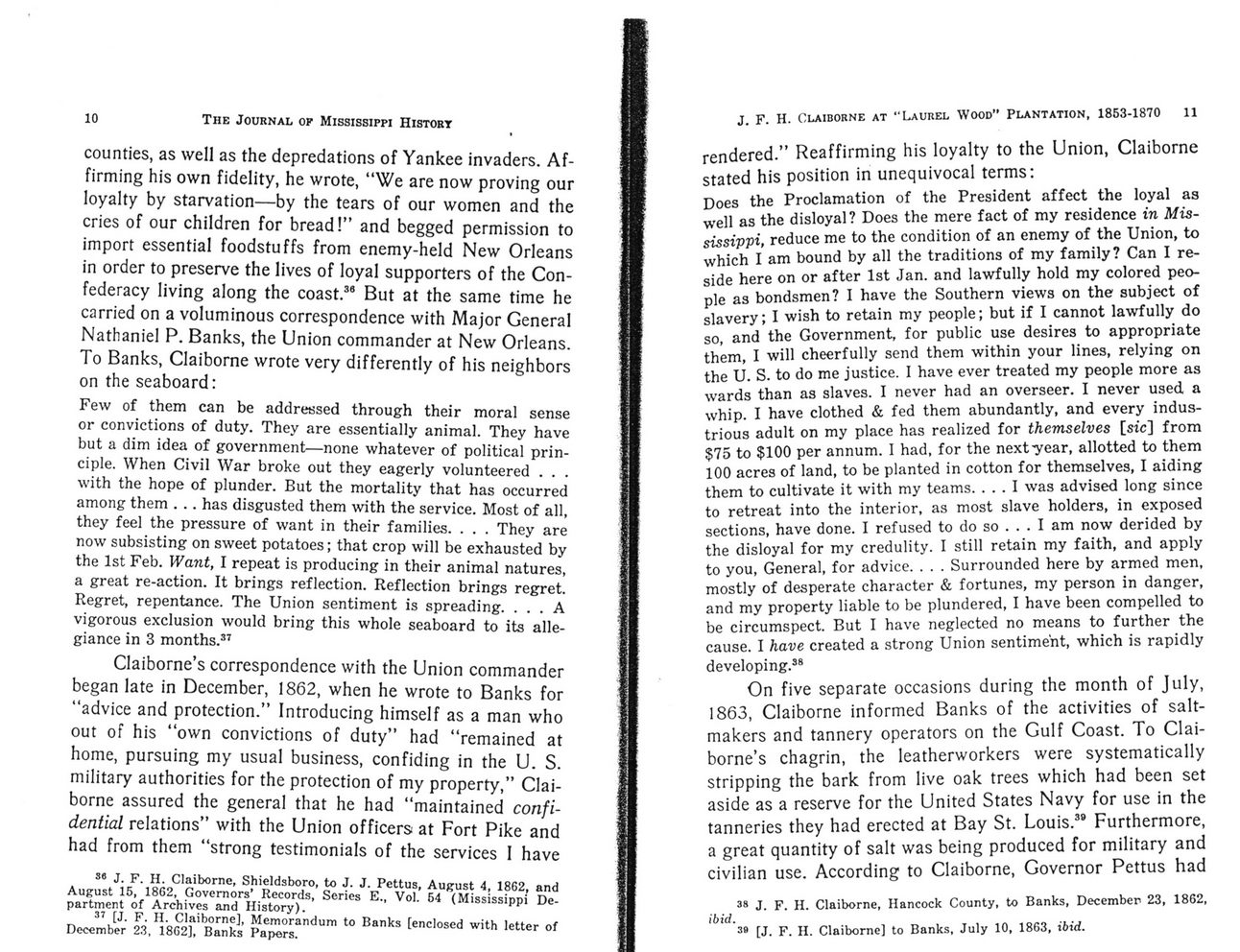This text was obtained via automated optical character recognition.
It has not been edited and may therefore contain several errors.
10 The Journal of Mississippi History counties, as well as the depredations of Yankee invaders. Affirming his own fidelity, he wrote, ?We are now proving our loyalty by starvation?by the tears of our women and the cries of our children for bread!? and begged permission to import essential foodstuffs from enemy-held New Orleans in order to preserve the lives of loyal supporters of the Confederacy living along the coast.36 But at the same time he carried on a voluminous correspondence with Major General Nathaniel P. Banks, the Union commander at New Orleans. To Banks, Claiborne wrote very differently of his neighbors on the seaboard: Few of them can be addressed through their moral sense or convictions of duty. They are essentially animal. They have but a dim idea of government?none whatever of political principle. When Civil War broke out they eagerly volunteered . . . with the hope of plunder. But the mortality that has occurred among them . .. has disgusted them with the service. Most of all, they feel the pressure of want in their families. . . . They are now subsisting on sweet potatoes; that crop will be exhausted by the 1st Feb. Want, I repeat is producing in their animal natures, a great re-action. It brings reflection. Reflection brings regret. Regret, repentance. The Union sentiment is spreading. ... A vigorous exclusion would bring this whole seaboard to its allegiance in 3 months.37 Claiborne?s correspondence with the Union commander began late in December, 1862, when he wrote to Banks for ?advice and protection.? Introducing himself as a man who out of his ?own convictions of duty? had ?remained at home, pursuing my usual business, confiding in the U. S. military authorities for the protection of my property,? Claiborne assured the general that he had ?maintained confidential relations? with the Union officers at Fort Pike and had from them ?strong testimonials of the services I have 38 J. F. H. Claiborne, Shieldsboro, to J. J. Pettus, August 4, 1862, and August 15, 1862, Governors? Records, Series E., Vol. 54 (Mississippi Department of Archives and History). 37 [J. F. II. Claiborne], Memorandum to Banks [enclosed with letter of December 23, 1862], Banks Papers. J. F. H. Claiborne at ?Laurel Wood? Plantation, 1853-1870 11 rendered.? Reaffirming his loyalty to the Union, Claiborne stated his position in unequivocal terms: Does the Proclamation of the President affect the loyal as well as the disloyal? Does the mere fact of my residence in Mississippi, reduce me to the condition of an enemy of the Union, to which I am bound by all the traditions of my family? Can I reside here on or after 1st Jan. and lawfully hold my colored people as bondsmen? I have the Southern views on the subject of slavery; I wish to retain my people; but if I cannot lawfully do so, and the Government, for public use desires to appropriate them, I will cheerfully send them within your lines, relying on the U. S. to do me justice. I have ever treated my people more as wards than as slaves. I never had an overseer. I never used a whip. I have clothed & fed them abundantly, and every industrious adult on my place has realized for themselves [sic] from $75 to $100 per annum. I had, for the next-year, allotted to them 100 acres of land, to be planted in cotton for themselves, I aiding them to cultivate it with my teams. ... I was advised long since to retreat into the interior, as most slave holders, in exposed sections, have done. I refused to do so ... I am now derided by the disloyal for my credulity. I still retain my faith, and apply to you, General, for advice. . . . Surrounded here by armed men, mostly of desperate character & fortunes, my person in danger, and my property liable to be plundered, I have been compelled to be circumspect. But I have neglected no means to further the cause. I have created a strong Union sentiment, which is rapidly developing.38 On five separate occasions during the month of July, 1863, Claiborne informed Banks of the activities of salt-makers and tannery operators on the Gulf Coast. To Claiborne?s chagrin, the leatherworkers were systematically stripping the bark from live oak trees which had been set aside as a reserve for the United States Navy for use in the tanneries they had erected at Bay St. Louis.39 Furthermore, a great quantity of salt was being produced for military and civilian use. According to Claiborne, Governor Pettus had 38 J. F. H. Claiborne, Hancock County, to Banks, December 23, 1862, ibid. 39 [J. F. H. Claiborne] to Banks, July 10, 1863, ibid.

Claiborne, J.F.H Claiborne-J.F.H-115